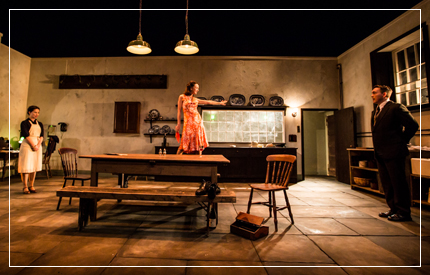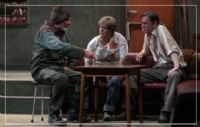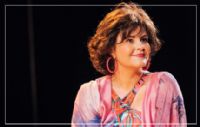After Miss Julie
Date: 04/04/2016
Theatre Review

An eye-opening, eye-rolling examination of individual image and personal depravity, Emma Jordan's adaptation of Patrick Marber's After Miss Julie astounds in its devastating intensity and gentle heartbreak. Sex, class and relationships come to the fore as Jordan and her impressive trio of actors, Lisa Dwyer Hogg, Ciaran McMenamin and Pauline Hutton, approach all aspects of a volatile emotional scale from an intimate, remote location – a large country house in Co. Fermanagh on VE Day in 1945, superbly brought to life by Jordan's Prime Cut Productions on the MAC stage.
After Miss Julie is, in itself, a re-imagination of August Strindberg's Miss Julie, a nineteenth century classic of European Theatre renowned for its shocking, revolutionary, immoral and lewd nature. All four of those dubious qualities are present here, albeit on more of a verbal level than a physical one. So much so, arguably, that After Miss Julie could qualify as a dark comedy of misunderstandings, its sharp, snappy and slippery verbosity enough to mark the troublesome divide and strained connection between Dwyer Hogg's titular Julie, McMenamin's John and Hutton's Christine. For better or worse, Julie is a variation on the archetypal Manic Pixie Dream-Nightmare Girl, someone who John initially, and wrongly, believes exists to give him the life and liveliness that a more dreary, domesticated union with Christine may not provide. The consequences for all three are naturally disastrous.
And so, in a manner worthy of the late, great Mike Nichols (he of The Graduate and Patrick Marber's Closer), the central theme of imbalance is tackled with determined and delirious dexterity. Each character, despite dislikeable traits and exaggeration for dramatic expression, is also painfully recognisable, fragile and empathetic.
Some viewers may, perhaps not unreasonably, point to a lack of chemistry between John and Julie, particularly when Dwyer Hogg and McMenamin are required to be a little more physical. But in the greater scheme of things, that's not really an issue, because there is no evident true romance in After Miss Julie. To these eyes, John, Julie and Christine's failure to properly connect with one another is a symbol for how they are wrapped up in themselves, the man's 'relationships' with both women indicative of how he perceives them as necessary commodities for prolonging both pride and image. From John's point of view, Christine seems an emblem of servile respectability, and Julie a token of lust. It's two sides of a self-gratification coin, aspects of 'love' that are really not related to love at all. The manner in which Dwyer Hogg, McMenamin, Hutton and Jordan dig deep to dramatize and realise this must be seen to be believed.
Jordan's direction is alternately kinetic and punchy, punctuating high energy with periodic, short bursts of quietly contemplative and shockingly visceral power. All three actors live and breathe the material, adapting impeccably to sudden changes in tone that may have derailed lesser productions. Among the highlights are a genuine show of devastation from Hutton as Christine copes with the discovery of John and Julie, and Dwyer Hogg's shaken vulnerability as Julie talks about her past.Â
These interludes are necessary amidst the fierce potency of this remarkable play, a tale of consequence with a concluding visual reflective of a reputation forever stained. In a sense, After Miss Julie completes a trilogy that began with Prime Cut's Mydidae, continued with Jordan's Educating Rita and finishes here - a three-pronged journey back in time about the potentially destructive, beneficial and revelatory naturalism in relationships between lovers and mentors.
Simon Fallaha
After Miss Julie runs at Belfast's MAC until Saturday 09 April.
After Miss Julie is, in itself, a re-imagination of August Strindberg's Miss Julie, a nineteenth century classic of European Theatre renowned for its shocking, revolutionary, immoral and lewd nature. All four of those dubious qualities are present here, albeit on more of a verbal level than a physical one. So much so, arguably, that After Miss Julie could qualify as a dark comedy of misunderstandings, its sharp, snappy and slippery verbosity enough to mark the troublesome divide and strained connection between Dwyer Hogg's titular Julie, McMenamin's John and Hutton's Christine. For better or worse, Julie is a variation on the archetypal Manic Pixie Dream-Nightmare Girl, someone who John initially, and wrongly, believes exists to give him the life and liveliness that a more dreary, domesticated union with Christine may not provide. The consequences for all three are naturally disastrous.
And so, in a manner worthy of the late, great Mike Nichols (he of The Graduate and Patrick Marber's Closer), the central theme of imbalance is tackled with determined and delirious dexterity. Each character, despite dislikeable traits and exaggeration for dramatic expression, is also painfully recognisable, fragile and empathetic.
Some viewers may, perhaps not unreasonably, point to a lack of chemistry between John and Julie, particularly when Dwyer Hogg and McMenamin are required to be a little more physical. But in the greater scheme of things, that's not really an issue, because there is no evident true romance in After Miss Julie. To these eyes, John, Julie and Christine's failure to properly connect with one another is a symbol for how they are wrapped up in themselves, the man's 'relationships' with both women indicative of how he perceives them as necessary commodities for prolonging both pride and image. From John's point of view, Christine seems an emblem of servile respectability, and Julie a token of lust. It's two sides of a self-gratification coin, aspects of 'love' that are really not related to love at all. The manner in which Dwyer Hogg, McMenamin, Hutton and Jordan dig deep to dramatize and realise this must be seen to be believed.
Jordan's direction is alternately kinetic and punchy, punctuating high energy with periodic, short bursts of quietly contemplative and shockingly visceral power. All three actors live and breathe the material, adapting impeccably to sudden changes in tone that may have derailed lesser productions. Among the highlights are a genuine show of devastation from Hutton as Christine copes with the discovery of John and Julie, and Dwyer Hogg's shaken vulnerability as Julie talks about her past.Â
These interludes are necessary amidst the fierce potency of this remarkable play, a tale of consequence with a concluding visual reflective of a reputation forever stained. In a sense, After Miss Julie completes a trilogy that began with Prime Cut's Mydidae, continued with Jordan's Educating Rita and finishes here - a three-pronged journey back in time about the potentially destructive, beneficial and revelatory naturalism in relationships between lovers and mentors.
Simon Fallaha
After Miss Julie runs at Belfast's MAC until Saturday 09 April.
More info : http://www.themaclive.com/shows/after-miss-julie





































